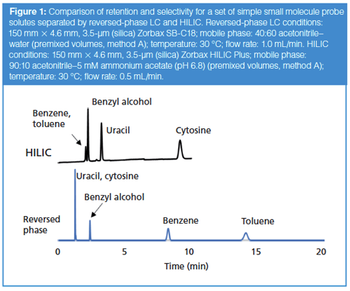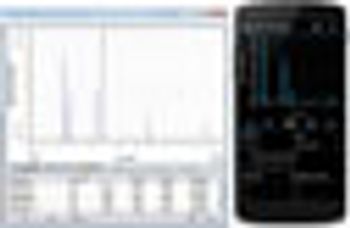
Here, we see how 2D-LC can solve coelution problems that are difficult or impossible to address using peak purity tools or curve resolution methods.

Dwight R. Stoll is the editor of “LC Troubleshooting”. Stoll is a professor and the co-chair of chemistry at Gustavus Adolphus College in St. Peter, Minnesota, USA. His primary research focus is on the development of 2D-LC for both targeted and untargeted analyses. He has authored or coauthored more than 75 peer-reviewed publications and four book chapters in separation science and more than 100 conference presentations. He is also a member of LCGC’s editorial advisory board. Direct correspondence to: amatheson@mjhlifesciences.com

Here, we see how 2D-LC can solve coelution problems that are difficult or impossible to address using peak purity tools or curve resolution methods.

A bad connection between an LC column and the rest of the system can ruin a good separation. New technologies may improve the quality of these connections and the likelihood of establishing a good connection in the first place. Understanding the issues will help you choose the best option for you.

With so many choices for fittings to use in making connections in my liquid chromatography (LC) system, how do I know which ones are the right ones for my application?

In part II of this series, we explore how curve resolution methods advance purity assessments and illustrate one of the most popular techniques, which adds a powerful tool to the chromatographer’s arsenal.

Is that peak “pure”? How do I know if there might be something hiding under there?

When preparing buffers for hydrophilic interaction chromatography (HILIC) separations, is the buffer concentration considered relative to the aqueous portion of the eluent only, or to the aqueous-organic mixture?

Certain details related to mobile-phase preparation that can be assumed in reversed-phase LC separations can be much more consequential in HILIC.

Is that peak “pure”? How do I know if there might be something hiding under there?

Is that peak “pure”? How do I know if there might be something hiding under there? In part I of this series, we explore some of the concepts behind peak purity assessments, describe some tools that are used in commercially available software for these assessments,

Paying attention to the details of mobile-phase preparation can have a big impact on the reproducibility of hydrophilic-interaction chromatography (HILIC) separations.

Paying attention to the details of mobile-phase preparation can have a big impact on the reproducibility of HILIC separations.

What are the most useful chromatography books on your bookshelf? What are the most useful web-based resources (such as websites, downloadable documents, videos) about separation science? What are the most useful tools supporting your work (such as calculators and simulators)? In this installment, Dwight Stoll compiles input from the separation science community (both individuals and vendors) to guide you to the resources that people find most useful.

So, what’s not in your standard operating procedure? Documenting details can prevent headaches associated with method transfers between laboratories.

What’s not in your standard operating procedure? Documenting details can prevent headaches associated with method transfers between laboratories.

Dwight Stoll, the new editor of “LC Troubleshooting,” asks John Dolan about the current state of chromatography training, John’s toughest troubleshooting challenge, the most common chromatographic mistakes, and what he foresees for the future.

So, what’s not in your standard operating procedure? Documenting details can prevent headaches associated with method transfers between laboratories.

Dwight Stoll, who will take the reins of “LC Troubleshooting” next month, spoke with John Dolan to get some insight on the current state of chromatography with John Dolan to get some insight on the current state of chromatography training, future troubleshooting problems, John’s toughest troubleshooting challenge, and the most common chromatographic mistakes.

How do non-alkylsilica columns provide us an additional dimension of column selectivity?

How do non-alkylsilica columns provide us an additional dimension of column selectivity?

When developing or modifying an LC separation, a common strategy is to change selectivity by choosing a new column. Here’s guidance for making that selection.

This is an exciting time for 2D-LC, as the expanding community of users works to develop creative solutions involving 2D-LC to solve analytical challenges that are very difficult or impossible to solve by conventional means.


We consider some of the details associated with preparing a column for storage, with an eye toward choices that will pay dividends in future use.

Several factors influence the useful lifetime of high performance liquid chromatography (HPLC) columns. In this instalment we consider some of the details associated with preparing a column for storage, with an eye towards choices that will pay dividends in future use of the column.

Delivering samples to the analytical column in “clean” mobile phase is important for robust methods and high-quality results.

Delivering samples to the analytical column in ‘clean’ mobile phase is important for robust methods and high quality results.

In his article, published in 2000, David V. McCalley found large increases in the efficiency for basic compounds at elevated temperature

Despite the utility of high performance liquid chromatography (HPLC) simulators, we found that all the free and low-cost simulators were outdated or had extremely limited functionality, so we created one that addressed these shortcomings. We developed a sophisticated, open-source HPLC simulator that is available for free as well as a version for Android users called "HPLC Simulator." Here we discuss a few questions that the simulator can help answer: Why are peaks narrower in gradient elution? What is gradient delay and how does it affect a separation?


The guest authors describe an optimization procedure to achieve the highest plate count in a given analysis time.